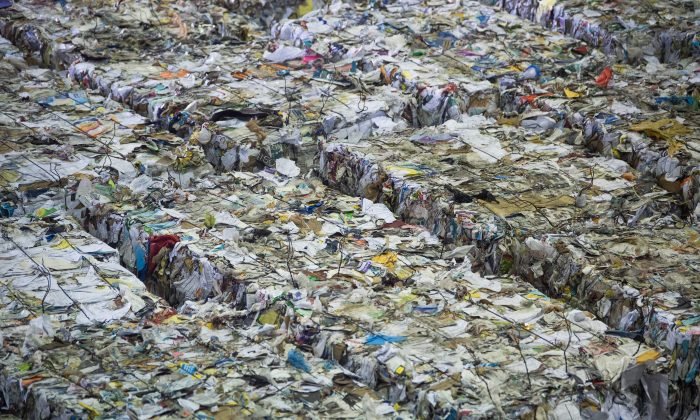Experts reveal that plastic is not as easily recyclable as previously believed, debunking consumers’ misconceptions.
Consumers have been misled about the recyclability of plastic. According to policy analyst David Allaway, it’s essentially state-mandated public deception.
Consumers have been misled about the recyclability of plastic, as industry labeling has caused the public to place too much trust in what is not an easy solution for reducing waste.
David Allaway, a senior policy analyst with the Oregon state’s Department of Environmental Quality (ODEQ), explained that the narrative surrounding plastic recycling was largely a public relations tactic to garner approval when plastic use was being criticized in the late 1980s because of the increasing waste it generated.
In 1989, when the Minneapolis City Council passed an ordinance banning most plastic packaging in grocery stores and fast food restaurants, other local governments in St. Paul, Minnesota, and Long Island, New York, were passing similar regulations.
The Society of the Plastics Industry (SPI), now the Plastics Industry Association, came up with a campaign in 1988 purportedly to help the public and recyclers sort different plastic resins apart from each other, he said.
Plastic was labeled with a resin identification code (RIC), a numerical series of symbols inside a triangle of chasing arrows. This code identifies the level of polyethylene terephthalate used in the plastic, which determines its recyclability.
But the code has long misled many into thinking that plastic labeled with the chasing arrows can go in the recycling cart and will be recycled,” Mr. Alloway said.
Moreover, the SPI successfully lobbied up to 40 states to require RIC labeling on plastic packaging by consumer brands like Coca-Cola, he explained.
However, Mr. Alloway pointed out that the change from chasing arrows to one solid contiguous triangle symbol has caused confusion among states over what symbol to use in manufacturing and recycling.
He mentioned that 36 states still require the chasing-arrow RIC codes on plastics, while some states like Washington, Oregon, and California have removed that requirement due to the resulting confusion. States like Oregon and Maine have enacted laws putting the responsibility for identifying recyclable packaging on the manufacturer.
Furthermore, the recycling industry has been warning the plastics industry since the 1990s about the misleading nature of the RIC codes, but no action has been taken because it financially benefits the plastics industry to perpetuate the belief that all plastics can be recycled.
According to Mr. Alloway, the SPI introduced the RIC at the request of recyclers in the 1980s. However, he argued that this framing is a way for the plastic industry to shift blame.
The plastic industry claims that the recycling industry advocated for the codes now mandated in over 30 states, but the issue of plastic waste persists, Mr. Alloway said.
He described the SPI’s RIC codes as “essentially state-mandated public deception.”
‘Federal Investment in Waste Management’
Nena Shaw, the director of the resource and conservation and sustainability division of the Environmental Protection Agency (EPA), told The Epoch Times that environmental law, dating back to the 1970s, is evolving to address these problems, including clarifying the confusion created by previous policies.
In December 2020, U.S. Sens. Sheldon Whitehouse (D-R.I.), Dan Sullivan (R-Alaska), and Bob Menendez (D-N.J.) passed the bipartisan Save Our Seas 2.0 Act, which establishes a research foundation and examines international and domestic policies to reduce ocean waste.
The study projected that by 2050, plastic production would increase significantly, resulting in 26,000 million metric tons, half of which would become waste, with up to 23 million metric tons entering the ocean annually.
The Biden administration’s Bipartisan Infrastructure Bill allocated $275 million for waste management improvements, which Ms. Shaw described as “the largest investment that we’ve made as a nation in this area.”
Last year, every state, territory, and the District of Columbia received funding to research and implement improvements to solid waste management capability and capacity, she stated. Additionally, 25 community grants, 59 tribal grants, and 25 recycling education and outreach grants were awarded to provide infrastructure improvements and education to address these challenges.
Ms. Shaw noted that the plastic waste stream has become increasingly complex over time due to a lack of investment in recycling technology. She emphasized the need to rethink how the United States deals with solid waste, especially since China stopped accepting U.S. plastic waste in 2018 under its National Sword policy.
She emphasized the need for a paradigm shift in how recycling is viewed globally, as plastic production continues to rise, and people become more aware of the waste they generate daily.
From April 23 to 29, the United Nations will host the fourth Intergovernmental Negotiating Committee on Plastics Pollution (INCPP) in Ottawa, Canada, where stakeholders will discuss global solutions to the issue, according to Ms. Shaw.
The ongoing problem of recycling plastic has improved over the years, according to Mr. Alloway. “Back in 2012, about 36 percent of the plastics collected for recycling in this country were being shipped overseas, but as of 2021, only 8 percent of the material is going overseas, and 92 percent is remaining in North America.”
This plastic recycling process in the U.S. involves commingle or single-stream recycling, where all plastic, paper, and metals are collected together, sorted at a material recovery facility (MRF), and then processed.
Mr. Alloway noted that plastics with RIC code number seven or three are sent to the landfill, as they cannot be recycled. Products with these codes include water bottles, citrus juice bottles, oven-baking bags, and custom packaging.
Remaining plastics that are not landfilled go to a plastics reclaimer company, where they are processed into pellets or flakes for reuse in other products.
While 92 percent of the plastic remaining in North America is processed at MRFs, the recycling process is not perfect. Some plastic ends up mixed with paper bales sent to mills, where the plastic is discarded into landfills.
Bales are sent to mills in the U.S. and overseas, like in East Java, Indonesia, where plastic pollutants distributed across the countryside have polluted the environment.
The current recycling system in the U.S. has inadvertently led to plastic waste being dumped in other parts of the world, creating an ongoing dilemma, he explained.
In response to a question about where the plastic waste goes, Mr. Alloway described the process as complex, indicating ongoing efforts to simplify the system and reduce plastic waste.
According to Ms. Shaw, 85 percent of Americans support efforts to reduce plastic waste, signifying a collective desire to address these environmental challenges.






